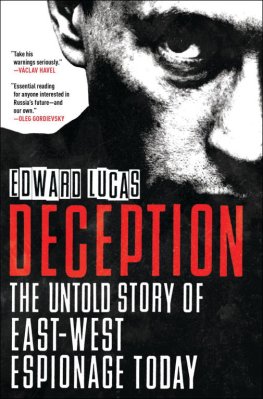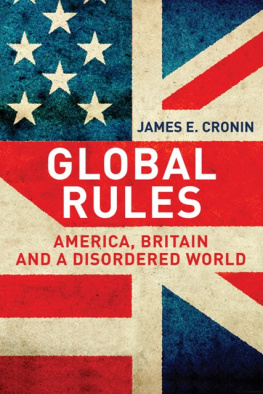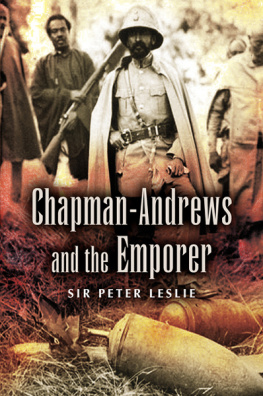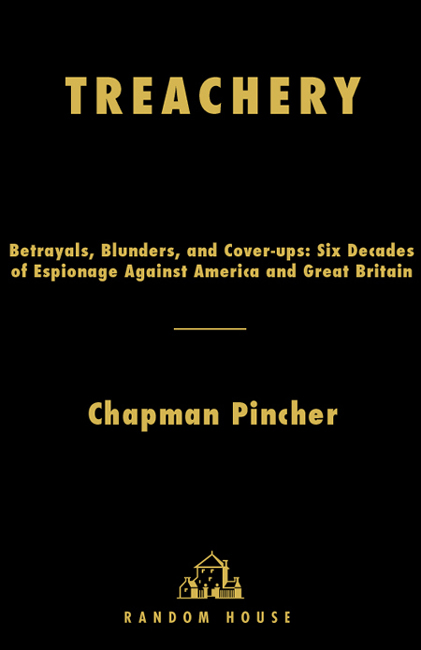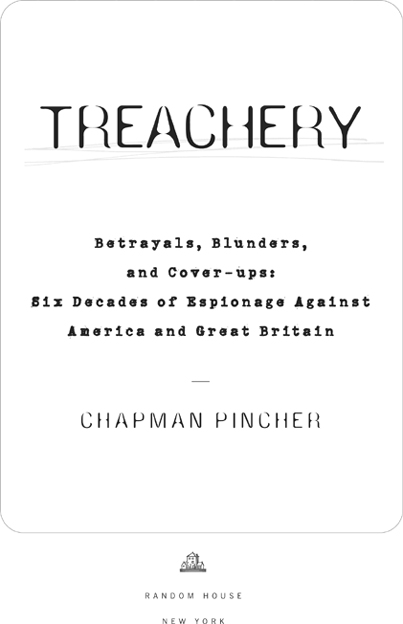INTRODUCTION
Admission
A FTER SIXTY YEARS OF INVESTIGATING THE MASSIVE RUSSIAN espionage assault on Great Britain and the United Statescurrently in dangerous resurgence with a militant Kremlin regime intent on restoring nuclear superpower statusI have become increasingly incensed and ashamed, as the detailed truth continues to emerge, by the daily peril cold-bloodedly imposed on the people of both countries by British traitors. Throughout time, there has been general agreement that the foulest brand of treachery is the betrayal of a close, confiding, and protective friend. In view of Britains eternal debt to the American people for their crucial assistance in preserving its liberty in two world wars and throughout the forty-five years of the cold war, their betrayal on such a staggering scale is cause for national remorse.
It is now apparent that the treachery not only threatened the British and American forces during World War II, but placed the whole free world in gravest jeopardy, when, for more than thirty years, Soviet nuclear missiles, perpetually aimed at British and American cities, could have paralyzed both nations in minutes, with colossal loss of life.
The chilling content of documents unexpectedly released in Russia since the collapse of the Soviet Union has revealed that updated copies of Britains most secret defense plans, including details of American intentions confided to the United Kingdom in joint interests, hemorrhaged regularly to Moscow. The Kremlins continued access to the evolving British and American defense strategy substantially increased the danger of a Soviet preemptive nuclear strike. As will be seen, some of the traitors exulted in their knowledge that the damage they were inflicting affected the security of the United Statesthe archopponent of their Communist creed.
Additionally, as intriguing new releases continue to reveal, an avalanche of ancillary secret information reached Moscow, year after year, on a scale that would never have been credible had not records of it become available.
Regrettably, the outrage we should all have felt has never expressed itself because a continuous conspiracy of deception by officials, assisted by politicians, ensured that the true extent of the evil that these traitors had perpetrated has been suppressed or systematically diluted to diminish its impact. Partly to conceal the ineffectiveness of the British secret services and their appalling penetration by Soviet moles, and especially to preserve relations with the United States, the responsible authorities have consistently ensured that the full truth should be withheld, being abetted by successive governments in doing so. All those involved in covering up the traitors treachery, protecting many of them from prosecution and public censure, thoroughly deserve to share their ignominy.
With the current political practice of apologizing for national crimes against humanity, such a shameful record cries out for full admission and sincere public apology, but such statesmanship is never likely to be forthcoming from any British authority now. No existing politician is aware, or wishes to be told, of the mass of detailed evidence that continues to accrue from both Russian and British sources. Officials of the British secret services are constitutionally averse to any avoidable admissions of their past incompetence and misdemeanors. I have therefore decided to place all the relevant facts so far exposed on record in this book, which, while presenting a fuller and more finely focused survey than has been possible before, also constitutes my personal apology.
I feel urged to make it as a World War II soldier who later developed close links with the American armed forces over half a century of defense reporting, involving expeditions with the U.S. Air Force, Navy, and Army, in which I developed friendships with men whom I admired for their dedicated professionalism. I also feel qualified to make it as an investigator who covered each espionage case as it occurred. Being now in a position to see the villainy in historical perspective, I feel particularly aggrieved as the treachery was committed by compatriots of my generation, those who deliberately covered up their crimes. Those who regard such a gesture as excessive may change their minds as they see the evidence unfold.
The current rise in Russian espionage activity in Great Britain and the United States, involving the recruitment of new traitors, and the evident danger of a new post-Soviet East-West nuclear arms race make all that is recorded in this book much more than academic history. Regarding human sourcesspies and agents on the ground, who will always remain essential in the intelligence warbasic Russian practice has not changed, as the British security authorities have publicly warned. So the disclosures presented here expose lessons to be learned in preserving todays Anglo-American partnership and tightening the bond between us for the hazardous period ahead.
The whole espionage debacle, now so starkly visible, prompts two crucial questions. Could ineptitude on such a scale by the British Security Service, known as MI5, in failing to detect so many traitors before they inflicted so much damage be due entirely to sheer incompetence? Or was there at least one long-serving penetration agenta supermole inside MI5, not only supplying the Kremlin with British and American defense and intelligence secrets, but protecting its other spies and agents, whenever practicable, by preventing effective action against them? The British people, the Americans, Canadians, and other allies whose security was also treacherously undermined, have a right to know how their life-threatening predicament arose, what was done about it, and especially what was not done. So this book also addresses one question in particular: If there was a supermole inside MI5 over many years, who was it?
This book is not an attack on MI5 as it currently behaves, but solely with respect to its suspiciously dismal performance against the intelligence assault by the Soviet Union. In view of its brilliant record against the wartime German threat, it seems pertinent to ask why that was so. In its attempts to conceal its failures, the extent to which MI5 blatantly exploited its license to lie, as now disclosed by its own documents and sponsored books, is astonishing.
Such serious charges, against a major department of state, and especially against deceased individuals, require the evidence to be presented in detail. The claim that such people should be immune to exposure because they are no longer here to defend themselves has never been acceptable and is now expunged by the passage of time.
Perceptive readers may appreciate my frustration at having been unaware of the extent of the criminality and incompetence when, as a national journalist, I could have exposed it while the perpetrators and those who covered up for them were still alive. Anyone who doubts that I would have done so should consult the many recently declassified prime ministerial, cabinet, and Defense Ministry papers recording the long series of secret efforts to stifle my activities, with one infuriated prime minister (Harold Macmillan) even urgingin writingthat I should be suppressed or got rid of.


